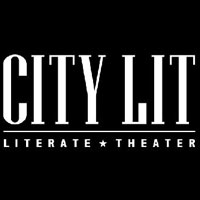
 *** Einstein and Mileva‘s quest for love in pursuit of the true nature of the quantum
*** Einstein and Mileva‘s quest for love in pursuit of the true nature of the quantum
As a self-professed lover of feel-good musical theater, I must admit to a bit of skepticism upon entering the small North Chicago theater hosting City Lit Theater Company’s premier offering of “Quantum Lovers, The Musical.” The story, presented in two acts, involves Einstein’s early adult years juggling the complexities of quantum physics and the duality of a soon-to-be unhappy marriage during the years leading up to and through World War I.
Surprisingly, the musical does begin upbeat and center stage, with an opening chorus of three very talented singers introducing the excitement that the turn of the 20th century has brought to the areas of scientific discovery and academic advancement. Shifting stage right to a bohemian café in Zurich, we meet graduate student Albert Einstein, played by Carson Carter, locked in engaging debate with Marcel Grossman (Ronnie Lyall) and Michelle Besso (Erick Heyer-Fogelberg), faithful friends and academic contemporaries who miss no opportunities to tease Einstein for both his unconventional ideas about Quantum Theory and his unbridled attraction to fellow graduate student Mileva Maric (Mikaela May).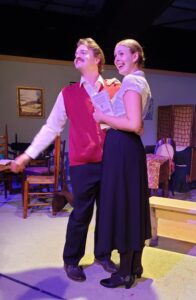
Juxtaposed with this time of unbridled opportunity for these intellectual men, we find young Mileva (Eliana Tirone) successfully passing her qualifying entrance exams yet fighting for her rightful place in the university physics program because she is, “… a girl, better suited to study art, or if science, something less demanding and more gender-appropriate, like biology.” This inequity – shocking not only for its unfairness but for its transferability with what still goes on today – will be Mileva’s storyline: forced to leave behind her studies once unexpectedly pregnant with Einstein’s child; bearing the burden and loss of motherhood; and ultimately abandoned and left uncredited for her work with Einstein in the advancement of Quantum Theory.
In addition to the diverging storylines of Albert and Mileva, “Quantum Lovers’” writer and lyricist, Hasan Padamsee, does a more than adequate job crafting the musical as a medium to explain the growing dominance of conservative nationalism throughout Germany and Europe which led to the inevitable events of World War I, and the alarming ways international events of today are mirroring those same threats.
Much of Einstein’s story in the years covered by the musical is well known: his years-long struggles to gain acceptance from university and scientific communities of his complex and counter-establishment beliefs on light as both wave and particle; his abandonment of Mileva as lover, wife, mother to his children and intellectual partner; his marital infidelities and ultimate divorce from Mileva; and his second marriage to his cousin, Elsa (nee Lowenthal) Einstein (Carleigh Ray).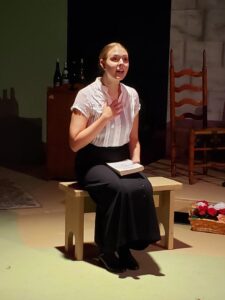
It’s no surprise that Padamsee, who taught physics to non-science students at Cornell University, was successful in crafting language and lyrics that explained the complexities of the quantum; what WAS surprising was his adeptness at crafting lyrics which allowed May the opportunity to flex her acting abilities and express the full range of emotions experienced by Milena: from the early passions of young physical and intellectual love of Albert; to her devastating grief at the unexpected loss of their young daughter; to the rage and rawness from Einstein’s ultimate disregard and abandonment. Ironically, it was the word-packed lyrics of several Act I Einstein songs where Padamsee perhaps missed some opportunities to say less and let the audience relate, understand and connect more.
Technically, the set design worked well for this up close, intimate stage setting, with small areas decorated with period furnishings allowing the audience to easily follow along from scene to scene, moving from universities to cafés to apartments in Zurich and Berlin. A monitor positioned upstage, center, and displaying captions with dates and descriptions of historical photos also helped to introduce the location and time frame for each scene. There were a few unfortunate misses detracting from what worked well on the set, like actors carrying new, glossy-covered paperback books versus those published at the turn of last century, obviously-empty versus filled cups offered in café and apartment scenes, and a not-yet-produced plastic AM-FM radio occupying an early 1900s residence.
Overall, the play worked well, but its 150-minute projected run time (a full 90 minutes before the first and only intermission) lost some audience members before the end of Act I. There may be an opportunity to shorten and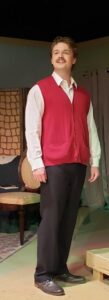 tighten up this production by looking at some of the repetitive, word-packed lyrics and language Albert sings and says, especially those detailing explanations of the science. In that regard, Carter’s portrayal of Einstein often seemed one-dimensional, missing opportunities to show and share passion. The one exception to this was Act II, Scene 3, the degenerating and explosive argument over divorce between Albert and Mileva, which was very well acted by both.
tighten up this production by looking at some of the repetitive, word-packed lyrics and language Albert sings and says, especially those detailing explanations of the science. In that regard, Carter’s portrayal of Einstein often seemed one-dimensional, missing opportunities to show and share passion. The one exception to this was Act II, Scene 3, the degenerating and explosive argument over divorce between Albert and Mileva, which was very well acted by both.
All in all, I rate this premier offering of “Quantum Lovers” a 3 out of 5 stars, with a strong recommendation to give it a try and see it if and when it returns to the stage!
“Quantum Lovers, The Musical” played for three performances August 11-13, 2023, at the City Lit Theatre, on the 2nd floor of the Edgewater Presbyterian Church, 1020 W. Bryn Mawr, Chicago.
Tickets were $25.00, previously available at https://scifun-productions.yapsody.com/.
To see what the season looks like, visit www.citylit.org





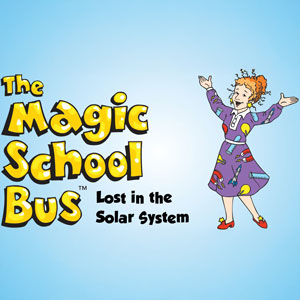
More Stories
“The Magic School Bus: Lost in the Solar System”
“February House” reviewed by Julia W. Rath
” A Lie of The Mind”